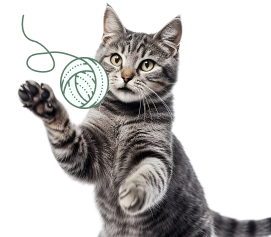- Based on our research, the best pet insurance plans for 2024 come from Lemonade, MetLife, and Spot.
- Lemonade offers budget-friendly plans while still providing thorough coverage for illnesses and accidents.
- MetLife is great for multi-pet households because they offer a family plan that insures up to 3 pets.
- Spot made our top three because they cover a lot of extras that other pet insurance companies don’t, like prescription food or microchipping.
Our top 3 picks for pet health insurance
Lemonade Pet Insurance

MetLife Pet Insurance

Spot Pet Insurance

Which pet insurance is best?
While every provider has its pros and cons, we found 3 pet insurance providers that stood out from the rest.
Lemonade Pet Insurance offers budget-friendly coverage with flexible plans and deductible options. Their accident coverage has no waiting period in most states, which is the shortest in the industry. As a bonus, you can bundle your pet insurance with other types of Lemonade insurance plans (renters, car, homeowners, etc) for added convenience.
MetLife Pet Insurance is the best for multi-pet households because it is the only provider that offers a family plan. Rather than buying separate plans for each pet, MetLife lets you add up to 3 pets on a single plan with shared coverage. You only pay one monthly premium and one deductible, but all 3 pets share the benefits. MetLife also allows you to combine other types of insurance with your pet plan.
Spot offers one of the most comprehensive pet health insurance plans available, making it the best choice for wide reaching coverage. Spot’s policies include coverage for exam fees, behavioral issues, prescription foods, microchipping and more, while still remaining an affordable option.
Also check out our roundup of the best pet insurance for dogs and the best pet insurance for cats.
Overview of top pet health insurance providers
Detailed overview of the best pet insurance providers for 2024
Lemonade Pet Insurance
Why We Like It
Editor's take
Lemonade is renowned for its affordable accident & illness coverage and its many customizable plans. They’re among the few providers that include an option for dental coverage, a valuable feature in pet insurance.
Lemonade is the only pet insurance provider we reviewed with no waiting period for accidents in most states. There is a 14-day waiting period for illnesses and a 30-day waiting period for orthopedic conditions. Waiting periods may differ depending on your location, so checking your policy details is important.
Lemonade’s easy-to-use mobile app lets you seamlessly manage your pet’s policy and file claims. Some users receive instant approval and reimbursement for their claims, while others may see it within a week. Lemonade is known for providing top-tier customer service and offers personalized, kind assistance to its customers.
Add-ons from Lemonade include coverage for preventative care, vet visit fees, dental illness, physical therapy, behavioral conditions, and end-of-life care and remembrance.
PROS
- Comprehensive coverage
- Discount for bundling with other policies from Lemonade
- Various add-ons available
CONS
- Age restrictions
- Not available in certain states
- No unlimited coverage option
MetLife Pet Insurance
Why We Like It
Editor's take
We love that MetLife has same-day accident coverage, which goes into effect at midnight on the day you buy a policy, a far shorter wait than many pet insurance companies require.
Illness coverage requires a 14-day wait before coverage is effective. Many orthopedic conditions are also covered at the time that illness coverage kicks in.
We also like how they offer a variety of discounts for pet parents, like multi-pet discounts, employer benefit discounts, first-responder discounts, health care worker discounts, and more. On top of that, your deductible has the potential to decrease each year you don’t file a claim!
If you have multiple pets, you can take advantage of their family plan. The family plan allows you to buy one policy, with one deductible and annual limit, that can be shared between up to 3 pets.
PROS
- Deductible as low as $50
- Coverage for exotic animals
- No initial exam required for enrollment
- Super short waiting period of accident coverage
CONS
- No unlimited coverage option
- No vet-direct pay
- Max 3 pets for multipet/family policy
Spot Pet Insurance
Why We Like It
Editor's take
Spot offers a wide range of annual coverage and deductible options to suit all budgets and is one of a few providers that offer a discount for owners with multiple pets (10%).
Another benefit to Spot is that there is no maximum enrollment age, meaning elderly pets can get coverage at any time.
Spot offers several plan options including an accident-only plan, an accident & illness plan, and 2 tiers of wellness add-ons (Gold & Platinum) which can cover things like teeth cleaning. With Spot Pet Insurance, euthanasia and exam fees (for covered conditions) are included with their accident & illness plan.
Spot has a 14-day waiting period for accidents, illnesses, and ligament/knee conditions. They even cover pre-existing conditions if they are considered curable and your pet has not had symptoms or treatments for at least 180 days.
PROS
- Unlimited coverage option
- Various options to customize your policy
- Preventive care add-on available
- Affordable plans
CONS
- Doesn’t cover prescription food
- Longer waiting period for accident coverage than many insurers
CarePlus by Chewy
Why We Like It
Editor's take
CarePlus is one of the only companies that offer up to 100% reimbursement for prescription products. There is no maximum age of enrollment and they offer unlimited coverage limits. With all CarePlus accident & illness plans, you’ll get access to telemedicine via chat/video which gives you free vet consultations. This can save you time and money before going into an office by ruling out whether something is an emergency.
CarePlus offers various levels of plans including their Accident Only plan, Value Accident & Illness plan, Essential Plus Accident & Illness plan, and the Complete Accident & Illness plan. You can customize your plan with optional add-ons such as the Preventive Wellness plan.
Depending on the plan you choose, you will have a 2-5 day waiting period for accidents, a 14-day waiting period for new illnesses, and either a 14-day, 30-day, or 6-month wait for cruciate ligament conditions. On the downside, dental disease and exam fees are not covered in all plans.
PROS
- No max enrollment age
- Covers prescription products
- Free online vet consultations
- Wellness plans are available
CONS
- Not all plans cover dental disease
- Higher prices than some insurers
- Won’t cover alternative medicine
Embrace Pet Insurance
Why We Like It
Editor's take
Embrace offers highly customizable plans and ample discounts to customers with multiple pets (10% off) or who are military members (5% off). They have an accident & illness plan with optional wellness coverage as an add-on. The wellness plan works like a savings tool, giving you access to funds upfront and letting you pay it off with your monthly premium.
In case of an emergency, you’ll also get access to 24/7 virtual assistance via telemedicine calls which can help you diagnose if it’s necessary to rush to an in-person emergency vet. This feature alone could save you hundreds on vet bills, which is another reason we love Embrace Pet Insurance.
With Embrace’s accident and illness plan you’ll have a two-day waiting period for accidents and a 14-day waiting period for illnesses. There is a six-month waiting period for canine orthopedic conditions, which can be reduced to 14 days if you complete an orthopedic exam and waiver process.
PROS
- Affordable plans
- Many options to customize plans
- Various discounts available
CONS
- Doesn’t pay vet directly
- No exotic pet coverage
Pets Best Insurance
Why We Like It
Editor's take
We like Pets Best because it offers competitively priced plans with a wide range of deductible options. This is great for people on a budget as it allows you to tailor your plan to what you can afford. There is also no age limit for sign-ups, meaning you can purchase coverage for your pet later in life. You’ll also get unlimited access to a 24/7 emergency vet hotline for quick consultations at all hours of the day.
Pets Best offers multiple plans including an Accident-only plan, as well as 3 tiers called Essential, Plus, and Elite. You can also opt for an add-on for wellness / routine care plans for an extra fee.
Last, but not least, Pets Best is one of the few providers who can pay the vet directly for you. Simply download the reimbursement release form from their website and have your vet’s office sign and agree to receive payment directly from the provider and Pet’s Best will handle the rest.
With Pets Best you can expect a waiting period of 3 days for accidents, 14 days for illnesses, and 6 months for cruciate ligament conditions.
PROS
- Unlimited coverage option
- Many deductible options
- No age limit for enrollment
- Vet-direct pay option
CONS
- Doesn’t cover alternative therapies
- Doesn’t cover breed-specific issues
Pumpkin Pet Insurance
Why We Like It
Editor's take
We love Pumpkin for its wide-reaching coverage and reimbursement level. Where other companies let you choose low reimbursement levels, Pumpkin ensures you get 90% back on covered claims and has no maximum age of enrollment. As an added benefit, owners with multiple pets get a 10% discount on policies. When it comes to coverage, what is offered as add-ons from other companies comes standard at Pumpkin.
Pumpkin has a standard accident & illness plan that covers exam fees, dental illnesses, behavioral issues, hereditary & congenital conditions, rehab therapies, and end-of-life services. You can also customize your plan with an optional add-on for preventative care.
With Pumpkin’s accident & illness plan, there is a 14-day waiting period. While this is longer than some other providers, Pumpkin has no extended waiting period for hip dysplasia or knee injuries making it a great option for animals prone to joint issues.
PROS
- Unlimited coverage option
- Optional wellness add-on available
CONS
- Only one reimbursement option
- No vet-direct pay
Healthy Paws Pet Insurance
Why We Like It
Editor's take
Healthy Paws has excellent customer reviews and is one of the few providers on the market that can pay the vet for you directly. This is a huge draw for many pet owners as it means next to no out-of-pocket costs to you. The only caveat is that you must call and request a simple authorization before the vet treats your pet. Otherwise, you can pay and be reimbursed.
Healthy Paws also offers many choices for reimbursement and deductibles, which is great for those wanting to tailor a plan to fit their budget. You can choose a reimbursement percentage between 50%-90%. Healthy Paws only offers an accident & illness plan with unlimited coverage. They don’t have an accident-only or wellness plan.
With the Healthy Paws accident and illness plan there’s a 15-day waiting period for accidents and illness and a 12-month waiting period for conditions linked to hip dysplasia. These are some of the longest waiting periods in the industry, which could be a deal-breaker for some people.
PROS
- Unlimited coverage
- Affordable plans
- Five reimbursement levels to choose from
CONS
- Max age limit for enrollment
- Doesn’t cover dental disease
- No wellness add-on available
Figo Pet Insurance
Why We Like It
Editor's take
Figo is known for its fast claim processing which is a huge benefit to its customers. Figo is one of the few providers that offer 100% reimbursement (on plans with deductibles of $500+). It’s also great for elderly animals as it has no age limit for enrollment.
You can also opt for add-ons that offer wellness coverage and reimbursement for vet exam fees. All plans come with 24/7 vet assistance chat. Video/phone telehealth consultations are available as part of the wellness add-on.
With Figo, there is a 1-day waiting period for accidents and injuries, which is one of the shortest in the industry. There is a 14 day waiting period for illnesses. For dogs, there is also a 6-month waiting period for orthopedic conditions. However, this can be waived if you get an orthopedic exam within the first 30 days of your policy and your pet is deemed healthy.
PROS
- Fast claim processing
- No max age limit for enrollment
- Short waiting period for accidents and injuries
- 100% reimbursement option
CONS
- Doesn’t pay vet directly
- No accident-only plan option
- More expensive than some insurers
Fetch by The Dodo
Why We Like It
Editor's take
Fetch by The Dodo offers simple and straightforward plans with some of the most comprehensive coverage on the market. Fetch only offers their Standard accident & illness plan, which includes TeleVet services and dental coverage at no extra cost. However, unlike some other providers, there is no preventative/wellness plan option with this provider.
We love Fetch because they cover many additional things that competitors don’t. If your pet is lost, Fetch will cover expenses for lost pet ads and will even chip in to offer a reward. If you are in the hospital, they’ll pay for boarding & kennel costs.
Fetch has a waiting period of 15 days for accidents & illness and a 6-month waiting period for injuries for knee & hip injuries. However, this can be waived if you get an orthopedic exam within the first 30 days of your policy and your pet is deemed healthy.
PROS
- Very comprehensive coverage
- Included telehealth services
- Covers boarding fees if owner is in the hospital
- Add-on coverage available
CONS
- No accident-only plan
- No multi-pet discount
- Requires pets to have a yearly checkup
Paw Protect
Why We Like It
Editor's take
Paw Protect offers an accident & illness plan as well as an optional Wellness plan available as an add-on. Like some other providers, it comes with 24/7 telemedicine coverage which allows you to speak to a vet in case you have an emergency and aren’t sure whether to take your animal in for a visit. This is called PawSupport, and is available even on nights, weekends, and holidays. It also offers considerable discounts if you have multiple pets (10% off) or are a military member (5% off).
We recommend opting for the unlimited plan with 90% reimbursement. However, if you are tight on cash, there are several other plan limits ($5,000, $10,000 & Unlimited) that offer great coverage at an affordable price.
Paw Protect accident and illness plan has a two-day waiting period for accidents and a 14-day waiting period for illnesses. There is a six-month waiting period for canine orthopedic conditions, which can be reduced to 14 days if you complete an orthopedic exam and waiver process.
PROS
- Unlimited coverage option
- Wellness plan add-on available
- Pays vet directly
CONS
- Max age for full coverage
- Doesn’t cover boarding
Best pet insurance companies
We know you love your pet and want to make sure they have the best pet insurance coverage. That’s why we’ve researched the top providers on the market to find out what they do best and help you choose the right plan.
Lemonade Pet Insurance
Best for pet parents on a budget
Lemonade is well-known for offering some of the best pet insurance plans at low costs. They offer a wide range of options when it comes to annual coverage, reimbursement percentage and deductibles, making it easy to customize the perfect plan for your budget. They also include dental disease as a covered illness, which many providers don’t, so you won’t be skimping on coverage.
Learn more in our Lemonade Pet Insurance review.
MetLife Pet Insurance
Best for multiple pets
MetLife helps you save by putting multiple pets onto one family plan. Accident coverage kicks in at midnight on the day you purchase your plan. It’s the shortest waiting period of all the pet insurance companies we compared. We were also impressed by the variety of discounts MetLife Pet Insurance offers to pet parents. More than just multi-pet discounts, MetLife offers employer benefit discounts, first responder discounts, discounts for health care workers, and more. They also offer exotic pet insurance in multiple states, not something many pet insurance companies can claim.
With MetLife, you don’t need an initial exam to enroll your pet and there is no upper age limit. Although traditional MetLife accident and illness policies don’t include wellness exams and dental cleanings, you can opt into their preventative care add-on to get coverage for these things and more.
Learn more in our MetLife Pet Insurance review.
Spot Pet Insurance
Best for comprehensive health coverage
We like Spot Pet Insurance for its comprehensive coverage. It covers more advanced and alternative therapies than most other providers, along with other inclusions like prescription food and microchipping. It’s also one of the providers with the most options when it comes to your deductible and maximum annual coverage limit. It offers one of the lowest max coverage amounts of $2,500, making it a great choice for those looking for cheap pet insurance. Pairing a low maximum annual coverage amount with a higher deductible will lower the cost of your monthly premium.
Learn more in our Spot Pet Insurance review.
CarePlus by Chewy
Best for prescription coverage
Most pet parents already know that Chewy offers exceptional customer service. CarePlus pet insurance by Chewy is no exception. Chewy partners with Lemonade and Trupanion, two of the best pet insurance companies on the market, to administer their plans. All policies come with 100% cost coverage on prescriptions. Another standout is the different coverage levels. While most companies offer one accident and illness plan or one accident-only policy, CarePlus offers two levels of accident and illness coverage (Essential Plus & Complete) which allows you to get the coverage you want at a price you’re comfortable with.
Learn more in our CarePlus by Chewy pet insurance review.
Embrace Pet Insurance
Best for wellness coverage
While many pet insurance companies offer optional wellness plans, Embrace’s Wellness Rewards plan stands out for its flexibility. There are no maximums for individual categories, like $30 for vaccines or $25 for flea and tick preventatives. Instead, it works like a savings tool. You select a total plan coverage amount of $300, $500, or $700, and get access to that full amount immediately (plus a $25 bonus). You can use that towards any covered wellness service, including things like grooming, nail trims, and training. You’re premium is basically paying off your coverage amount in monthly payments.
Embrace also has good coverage for their accident and illness policies, and like many of the best pet insurance companies, offer several deductible and reimbursement options to customize your plan.
Learn more in our Embrace Pet Insurance review.
Pets Best Pet Health Insurance
Best range of deductible options
With deductible options as low as $50 and as high as $1,000, Pets Best is a top choice for pet parents looking to save at the vet’s office. Choosing a low deductible will cost a bit more on your monthly premium, but once you hit that deductible the rest of your expenses will be reimbursed at whichever percentage you choose on your plan. If you choose the higher deductible, you’ll have to pay that much out of pocket before insurance kicks in to cover the rest, but your monthly premium will be lower.
Learn more in our Pets Best Insurance review.
Pumpkin Pet Insurance
Quickest coverage for ligament and knee injuries
Pumpkin Pet Insurance covers knee and ligament injuries after only a 14 day waiting period. Many other companies have waiting periods up to 6 months for similar coverage. Another thing we love about Pumpkin is how they treat pre-existing conditions. They recognize that some pre-existing conditions are curable (like an ear infection). If your pet is “cured” and has no treatment or symptoms for 180 days, and then comes down with the same problem again, it’s considered a new occurrence and can be covered by your policy.
Learn more in our Pumpkin Pet Insurance review.
Healthy Paws Pet Insurance
Best range of reimbursement options
If lowering your monthly premium is a main concern, Healthy Paws might be the best pet insurance provider for you. They are the only company on our list that offers reimbursement percentage options as low as 50%. While this means you will only get reimbursed for 50% of your vet costs after filing a claim, choosing this option will result in a lower monthly premium. Healthy Paws is also one of the few pet insurance brands that offers vet direct pay.
Learn more in our Healthy Paws Pet Insurance review.
Figo Pet Insurance
Fastest claim processing
We love Figo Pet Insurance because they reimburse you quickly for your pet’s medical expenses. Customers often comment on their fast claim processing, meaning you get your money back faster. They also offer additional add-on packages that cover things like wellness visits and exam fees. In some cases, Figo can also treat curable pre-existing conditions if your pets show no symptoms within 12 months of treatment.
Learn more in our Figo Pet Insurance review.
Fetch Pet Insurance
Best for extensive coverage & perks
We love Fetch because it’s one of the best pet insurance companies you can choose when it comes to coverage. Every plan includes treatment for dental illnesses and injuries, acupuncture, chiropractic care and other specialty services that many other providers don’t cover. They also include a lot of additional perks, like covering the cost of reward money if your pet is lost or boarding fees if you are hospitalized and can’t care for your pet. They also offer a 10% discount to military members.
Learn more in our Fetch Pet Insurance review.
Paw Protect
Best for 24/7 virtual vet help
All Paw Protect plans come with PawSupport, a helpline that gives you 24/7 access to veterinary professionals, even on nights or weekends. While they can’t diagnose illnesses or prescribe medications, this is a great feature to use for help answering questions about symptoms or determining if an after-hours situation requires an emergency vet visit.
Learn more in our Paw Protect Pet Insurance review.
What is pet insurance?
Pet insurance is a type of health coverage designed to help pet owners manage the cost of veterinary care for their animals. It typically covers a range of services, including emergency treatments, surgeries, medications, and sometimes routine care like vaccinations and wellness exams.
When you have pet insurance, you pay a monthly premium based on your pet’s age, overall health status and other factors. By paying this premium, you can receive financial reimbursement when your pets need medical attention, helping to reduce the out-of-pocket expenses that can arise from unexpected illnesses or injuries. Pet insurance provides peace of mind and ensures that pets receive the best possible care without the burden of high veterinary bills.
How does pet health insurance work?
Pet insurance works by reimbursing pet owners for some or all of their pet’s eligible medical expenses after a veterinary visit.
Once you have coverage in place, you typically submit a pet insurance claim online or through an app, providing proof of the veterinary services performed and your payment. The insurance company reviews your claim, and if the services are covered under your policy, you receive reimbursement.
Some providers also offer direct payment to the vet, eliminating the need to pay out of pocket and wait for reimbursement. This option varies by provider, so it’s essential to check how your insurer handles direct payments. For more on this, see our guide to pet insurance that pays vets directly.
Before you buy insurance for your pet, you need to understand these terms:
-
Max annual coverage:
Many pet insurance companies have annual coverage limits on their plans. The annual limit, also known as the annual payout limit, is the maximum amount of eligible vet expenses your insurance company will cover in a calendar year. If you have an annual limit of $10,000 and your cat develops a serious illness requiring $12,000 worth of treatment, your insurance company will only reimburse $10,000 of eligible expenses. You’ll have to pay the other $2,000 on your own. - Reimbursement level: This is the amount of money the pet insurer will give you back (i.e. if you have a $2,000 expense and a 90% reimbursement rate, the insurance company will reimburse you for $1,800).
- Deductible: This is the amount of money you have to spend each year before the insurance company pays anything.
-
Waiting period:
Most pet insurance companies include waiting periods in each policy. A waiting period is how long you have to wait between the time you sign up for insurance and the time it takes effect. For example, if you purchase pet insurance with a 14-day waiting period on January 14, your policy won’t go into effect until January 29. While you won’t find any pet insurance with no waiting periods at all, they do vary by provider and some are much shorter than others. -
Exclusions:
When you read your insurance documents, you may see a list of exclusions. An exclusion is anything that isn’t covered by your pet insurance. -
Veterinary restrictions:
In most cases, pet insurance companies allow you to see any vet in your area. Since most insurance companies reimburse you directly, there’s no need to go to an in-network vet or worry about other veterinary restrictions. This makes it much easier to get the care your pet needs. -
Condition limits:
Some pet health insurance policies also have limits on how much they’ll reimburse for specific medical conditions. For example, your plan may reimburse a maximum of $3,000 for treating a luxating patella.
What does pet insurance cover?
The amount of coverage available depends on the type of pet insurance policy you purchase.
You typically have the option of getting an accident-and-illness plan, an accident-only plan or a pet wellness plan.
Each type of insurance provides a different level of coverage:
- Accident-and-illness pet insurance: This is the most comprehensive type of pet insurance available. That’s why it’s often referred to as “nose-to-tail” insurance. This type of pet health insurance reimburses you for veterinary expenses associated with covered illnesses and accidents. Some of the best pet insurance plans even come with pet dental coverage.
- Accident-only pet insurance: This type of plan covers the cost of treating physical trauma caused by accidents. For example, if your dog injures its paw during a hike, this type of plan would reimburse you for the accident-related vet bills.
- Pet wellness coverage: Pet insurance companies also offer wellness coverage, which covers exam fees and other forms of routine care. Some wellness plans even cover dental cleanings.
For more information on what these types of plans include, check out our complete guide on what pet insurance covers.
Does pet insurance only cover cats and dogs?
Most pet insurance policies only cover cats and dogs. However, some pet insurance companies cover other animals. For example, ASPCA Pet Health Insurance covers horses. You may even be able to find an exotic pet insurance policy to cover your bird or lizard.
Compare pet insurance plans side-by-side
Select the two providers you would like to compare using the drop-down selectors below. In each column you can see what each provider covers. Similar coverage and conditions are grouped by category below.


 Join the over 2,438,795+ insured cats & dogs across the US
Compare pet insurance plans & prices from top providers in minutes
COMPARE QUOTES
Join the over 2,438,795+ insured cats & dogs across the US
Compare pet insurance plans & prices from top providers in minutes
COMPARE QUOTES

What doesn’t pet insurance cover?
Although some policies are comprehensive, pet insurance doesn’t cover everything.
Most pet insurance plans exclude the following:
- Pre-existing conditions: Most pet insurance plans exclude preexisting conditions, which are medical conditions that exist before you buy a policy. Pet insurance companies typically ask you to provide your pet’s vet records to determine if any preexisting conditions should be excluded. For example, if your cat had dermatitis before you purchased a plan, your insurer probably won’t pay any vet bills associated with dermatitis treatment. However, some pet insurance companies will cover what they deem as “curable” pre-existing conditions. For more information, read our guide on pet insurance that covers pre-existing conditions.
- Routine care: Unless you buy wellness coverage, there’s a good chance your policy won’t cover exam fees or preventive care. Therefore, most pet insurance plans don’t cover vaccinations, spaying or neutering, and other routine pet care. Luckily, most wellness plans can be purchased as an add-on to your regular pet insurance policy.
- Elective or experimental treatments: No matter how much you care for your pet, your insurer probably won’t pay for elective procedures or experimental treatments. For example, if you plan to compete in dog shows, your insurance won’t cover the cost of tail docking or other procedures used to meet specific breed standards.
- Breeding: Standard pet insurance plans don’t cover vet bills related to breeding. However, some pet insurance companies do offer breeding coverage as an add-on to a regular policy. Add-ons give you extra coverage for medical expenses that are excluded from a standard pet insurance plan.
Is pet insurance worth it?
For many people, pet insurance can absolutely be worth it. It may seem unnecessary to pay monthly to cover your pet if they’re generally healthy, but if they get injured or sick, pet insurance can save you a ton of money.
How pet insurance can save you money: An example
If you pay $35 per month on Fluffy’s pet insurance policy, that’s $420 per year. Imagine that 3 years in, Fluffy needs emergency surgery that would cost $3,000 without pet insurance.
Your policy has a 90% reimbursement rate and a $250 deductible, so you pay that $250, leaving your balance at $2,750. The pet insurer reimburses you for 90% of the remaining cost ($2,475), and then you have to pay the other 10% ($275).
Although 3 years in, you would have paid $1,260 for your insurance policy, you essentially saved $1,215 ($2,475 (what the insurance company paid on the surgery) - $1,260 (what you paid for pet insurance) = $1,215).
How much does pet insurance cost?
The best pet insurance plans cost an average of $20 to $50 per month, depending on your animal. Although, you can easily spend more if your pet requires advanced care.
The table below shows the average cost of insuring a dog or cat at three different ages:
| Age | Mixed-Breed Dog | Mixed-Breed Cat |
|---|---|---|
| 1 | $42.75 | $32.41 |
| 4 | $48.29 | $34.95 |
| 7 | $72.27 | $48.95 |
Every quote is based on a 90% reimbursement rate, a $500 deductible and a $10,000 annual coverage limit for pet owners living in ZIP code 90001.
Factors that impact the cost of pet insurance
Multiple factors impact the cost of pet insurance:
Type of pet
The type of pet you have has a big impact on how much pet insurance costs. Most pet insurance companies charge more for dog insurance than cat insurance. Also, you’ll likely pay more to insure large dogs, as they’re more prone to heart conditions and joint problems.
Breed
Some breeds have higher vet expenses than others, which may increase your premium. For example, Rottweilers are susceptible to hip dysplasia, elbow dysplasia and aortic stenosis, an illness that causes narrowing of the aortic valve.
Age
If you want to give your pet the best care, sign it up for pet insurance at a young age. Enrolling early gives you a chance to secure coverage before your pet develops any pre-existing conditions. Your premiums will also be lower for a young pet than for an older pet.
Gender
It costs a little less to care for female pets, so your premium may be higher if you have a male dog or cat.
Location
The cost of living in your city also plays a role in determining how much you pay for pet insurance. Pet owners in Los Angeles, Seattle, New York, San Francisco and other major cities tend to have higher costs than pet owners in rural areas.
Coverage options
Your annual limit, deductible and reimbursement rate all have an impact on your pet insurance premium. A deductible is what you must pay out of pocket before your insurance company starts covering any eligible vet expenses. Your reimbursement rate is the percentage of eligible expenses that your policy covers. For example, if you have a 90% reimbursement rate, your insurer will reimburse you for 90% of the costs associated with treating a covered illness or injury.
For a closer look at how these factors impact the overall cost, check out our complete guide on how much pet insurance costs.
How to save on pet insurance
Follow these tips to reduce the cost of insurance for your pet:
- Discounts: Many companies offer discounts for spaying or neutering your pet, adding multiple pets to one policy, bundling your pet policy with another type of insurance or belonging to a specific organization. Before you commit to a plan, ask if you qualify for any of these discounts.
- Payout caps: To reduce your monthly premium, choose a plan with a lower payout cap. For example, if you’re comparing policies with limits of $10,000 and $15,000, choosing the plan with the $10,000 limit can help you save money.
- Lower reimbursement percentages: The higher your reimbursement percentage, the more it costs to have pet insurance. Lower your costs by dropping the reimbursement rate from 90% to 80% or 80% to 70%.
- Higher deductible: When you choose a high deductible, you pay for a larger percentage of your pet’s care out of pocket. Try increasing your deductible from $250 to $500 or $1,000 to rack up more savings.
Our guide to cheap pet insurance can help you find an affordable plan to suit your budget and your pet’s needs.
How to find the best pet insurance for your pet
To find the best pet insurance, follow these steps.
Choose your type of plan
Decide whether you want an accident-only health plan, an accident-and-illness plan or a wellness plan that covers exam fees and other routine expenses.
If you’re on a budget, choosing accident coverage instead of a more comprehensive coverage plan can help you save money. If price isn’t much of a concern, look for an accident-and-illness plan with multiple add-ons to get the best coverage.
Choose the coverage level you want
Think about how much coverage you need to ensure your pet gets high-quality care. If you don’t have much money in your savings account, look for insurance with a high reimbursement rate and a low deductible. With this approach, it’s possible to minimize your out-of-pocket expenses.
If you have a good-sized emergency fund, you may not need as much coverage. Choosing a plan with a high deductible and a lower reimbursement rate can help you save money without leaving you in a financial bind.
Look for available discounts
Many of the best pet insurance providers offer discounts for things like adding multiple pets or paying your yearly premium up-front.
Find out if you qualify for any of these common discounts:
- Multi-pet: Many companies offer a multi-pet discount to pet parents who add multiple furry friends to one policy.
- Employer: Some employers include pet insurance discounts in their benefits packages. Check with your HR department to find out if you qualify.
- Spay/neuter: To encourage pet parents to fix their pets, some insurance companies offer spay/neuter discounts. If your insurer is one of them, you may want to wait until after your pet is fixed to apply for coverage.
- Military: If you’re in or retired from the military, you may qualify for a discount. Some companies even extend this discount to National Guard and Reserve members.
- Annual pay: Many insurers offer a discount for paying your annual premium all at once instead of making monthly payments.
- Bundle: If you purchase pet insurance from the same company that handles your auto or home insurance, you may qualify for a bundle discount.
Check waiting periods and other exclusions
Before you commit to a plan, check for waiting periods and other exclusions. Your insurer may require you to wait 14 days, 30 days or even longer to use your policy. It may also exclude certain expenses, such as breeding costs or expenses associated with elective procedures. Checking for exclusions gives you a better idea of what each company covers.
Research and compare pet insurance providers
The next step is to research and compare insurance providers. Taking time to research each company can help you avoid scams and overpriced policies that don’t cover much. Once you have a list of insurers, ask your veterinarian if they recommend a specific one.
Another option is to use online review sites to determine if each company has a positive or negative reputation. When you read through pet insurance reviews, look for common themes. It’s not unusual for a company to have a few unhappy customers, but if every review mentions poor customer service or too many exclusions, you may want to avoid that provider.
Get multiple quotes and compare prices
Use a pet insurance comparison tool to get multiple quotes and compare prices all in one place. Comparison tools are helpful because they eliminate the need to give your contact information to multiple insurers.
When comparing prices, make sure that each plan has the same deductible, annual limit and reimbursement rate. Comparing plans with different terms makes it difficult to determine which one is truly the most affordable.
Examine extra costs
If any of the plans you’re considering have available add-ons, think about whether you really need them. Some are valuable, while others increase the cost of your insurance without giving you much in return. For example, if you have enough in the bank to cover the cost of exam fees and vaccinations, you probably don’t need an add-on that pays for these services.
 Join the over 2,438,795+ insured cats & dogs across the US
Compare pet insurance plans & prices from top providers in minutes
COMPARE QUOTES
Join the over 2,438,795+ insured cats & dogs across the US
Compare pet insurance plans & prices from top providers in minutes
COMPARE QUOTES

Best pet insurance FAQs
What is the best pet insurance?
Based on our research criteria, we believe the best pet insurance plans for come from Lemonade, MetLife, and Spot.
However, the best pet insurance plan is the one that offers you the coverage you need while maximizing your benefits and minimizing your out-of-pocket costs. If you’re still having trouble deciding, consider reading our full article where we explain how to find the best pet insurance.
Is pet insurance expensive?
Compared to the cost of paying for everything out of pocket, pet insurance is relatively affordable. However, you’ll want to ensure you understand your coverage and take full advantage by using it.
The average cost of pet insurance is around $19 to $30 per month, but you may end up spending more if your pet needs advanced care or if you decide to opt for a wellness plan that covers routine care.
Can you get pet insurance to cover vaccines?
If you get pet insurance with a wellness plan, it can usually cover vaccines, exam fees and other routine expenses.
Does pet insurance cover prescription medications?
Many pet insurance policies cover prescription medications and even prescription foods used to treat certain covered illnesses. That said, pet insurance doesn’t usually cover medications used to treat pre-existing conditions or other conditions excluded in your policy.
Is pet insurance tax deductible?
Pet insurance is not tax deductible unless your pet contributes to your income in some way. For example, if you use a border collie to herd sheep on a working farm, you may be able to deduct its pet insurance premiums on your business tax return.
Do all vets take pet insurance?
Pet insurance doesn’t work like human health insurance. In other words, vets don’t usually bill the pet insurance company. Instead, your insurer reimburses you for expenses you’ve already incurred.
There are a few pet insurance policies that will pay the vet directly, similar to how human health insurance works. However, some vets may not work with these providers.
What is the typical monthly cost of pet insurance?
On average, we’ve found that pet insurance costs about $15-$40 per month for cats and $25-$75 per month for dogs. However, the cost fluctuates based on your individual scenario, such as the age and breed of your pet, and the level of policy coverage you choose. We recommend comparing prices here.


















































